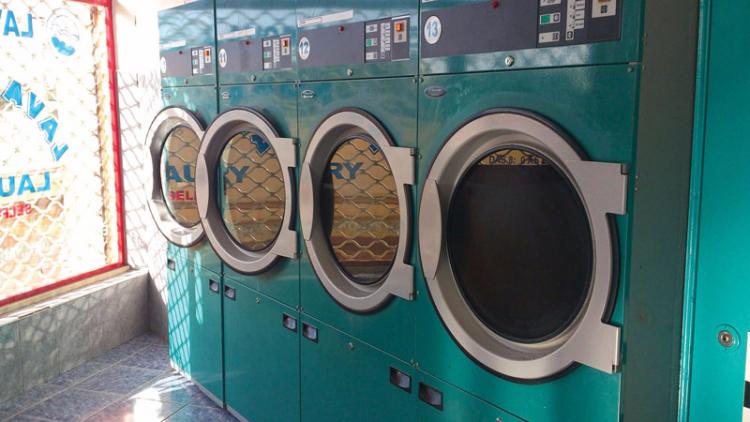Laundry While Cruising Can Be an Adventure of Its Own
Sailing across an ocean can change your attitude about many things. It will force you to respect the weather, the power of the wind, and the size of the waves. It can give new meaning to small tasks, such as using the toilet or preparing food in rough seas. It can make you keenly aware of how much electricity is needed for everyday things. And it can make you miss a washer and dryer like you’ve never missed anything before.

When we sailed across the Atlantic, I started fantasizing about doing laundry as early as the Gulf Stream. We had rough heavy weather all the way to Bermuda and even though our boat doesn’t leak, the salty dampness found its way into what had been clean sheets a few days earlier and into clothes that were not in lockers. When we pulled into St. George’s Harbor, I was more excited about finding the laundromat than I was about seeing the island. (I still have a laundry card from Bermuda in my wallet.)
A few hundred miles from the Azorean island of Faial, I found myself dreaming of big washing machines swishing away with our clothes, sheets, and pillow cases inside, followed by huge driers blasting warm, dry, salt-free air all over the freshly cleaned laundry. But on arrival, we learned that 1.) The laundry facilities at the marina were tiny, expensive, and the dryer worked only “on occasion;” 2.) We had the option of taking our laundry to a “Lavenderia Service,” where someone else does it all for a steep fee; and 3.) This was how it is in Portugal. Period. Well. This was going to make life interesting since Portugal was our main destination.
And so it was for the next two years: doing laundry wherever we went became an event that we now look back on with cherished memories. We did find many coin operated washers and driers in marinas. Some great. I can picture each one in my head. Sometimes we opted for hang drying if the air wasn’t too humid or salty. We had to rely on the laundry services a few times, but they were very expensive. One guy ruined two shirts, a pair a good shorts, and a towel. Not good. And there were a few places that we had no other option than to hand wash in buckets and hang dry. My husband, Robert, even rigged a leach line from the forestay to the mast for large things to hang. On windy days, when clothes pins wouldn’t hold, we used industrial spring clamps. In one small town in southern Portugal called Olhao (pronounced Ol yowl), we actually found an American-style, do-it-yourself, coin-operated laundromat, and it was like finding gold!
We’d make a day of doing laundry, pulling our carts full of clothes and linens along the cobblestone streets, past cafes, castles, and colorfully tiled ancient buildings to the laundromat where we spent the afternoon washing, reading, drying, and folding. When we did laundry in marinas, we often met other cruisers and shared sea stories. Sometimes there were book exchanges in the marina laundry rooms. We left many books and picked up many, enhancing our own library.
Probably the most interesting marina laundry was in the town of Las Palmas, on the island of Gran Canaria in the Canary Islands. The huge marina there is the site for the start of Jimmy Cornell’s now famous Atlantic Rally for Cruisers or ARC. Geographically, Las Palmas is an excellent starting place for sailing west across the ocean. By late October, the marina and harbor is packed full of boats getting ready to either sail with the ARC boats or cross on their own. The trade winds start to fill in during November and blow through February, making these months the best for the crossing. The energy and excitement is tangible. And the marina laundry room is always busy.
Flocking to Las Palmas is a certain breed of folks whose main goal in life is to roam around seeking big adventure, like sailing across the ocean. Here they hang around searching for boater types and asking to be crew. Like falling leaves and morning frost, these drifters show up every fall looking for a berth. The laundry room at the marina is where these guys advertise. Taped on the walls, stuck on the machines, and fluttering in the doorway are fliers, posters, and signs, selling the drifters’ talents such as juggling, singing, playing the flute, cooking, cleaning, doing card tricks, and maybe some sailing skills. These folks, and we met many, might think they are “nonconformists” by wearing baggy clown pants, long dreadlocks, funky hats, and lots and lots of beaded things. But when they all hang together, you can’t tell one from the other. I wondered how many of them got on a boat, and if so, did they like the ocean? We got to know a few fairly well. We did see one of these guys later in Cape Verde, and he was really enjoying his trip. Another guy we met had left and then came back to Las Palmas, stating he had “issues” with the captain.
The marina and the flier-filled laundry room are their main connections to the ocean crossing world, where they hope to experience a chance of a lifetime. I suspect they spend countless hours dreaming of sailing off into the trade winds, strumming their guitars or writing poetry. They probably envision sunny days filled with warm breezes and nights filled with stars. And then there’s me, dreaming of fresh dry sheets and soft towels. It’s all part of ocean sailing. But hey, I loved those warm breezes and starry nights! I even loved the heavy weather! I’d go back in a heartbeat, damp sheets and all. Just don’t get in my way when I head to the nearest washing machine when we make landfall.




